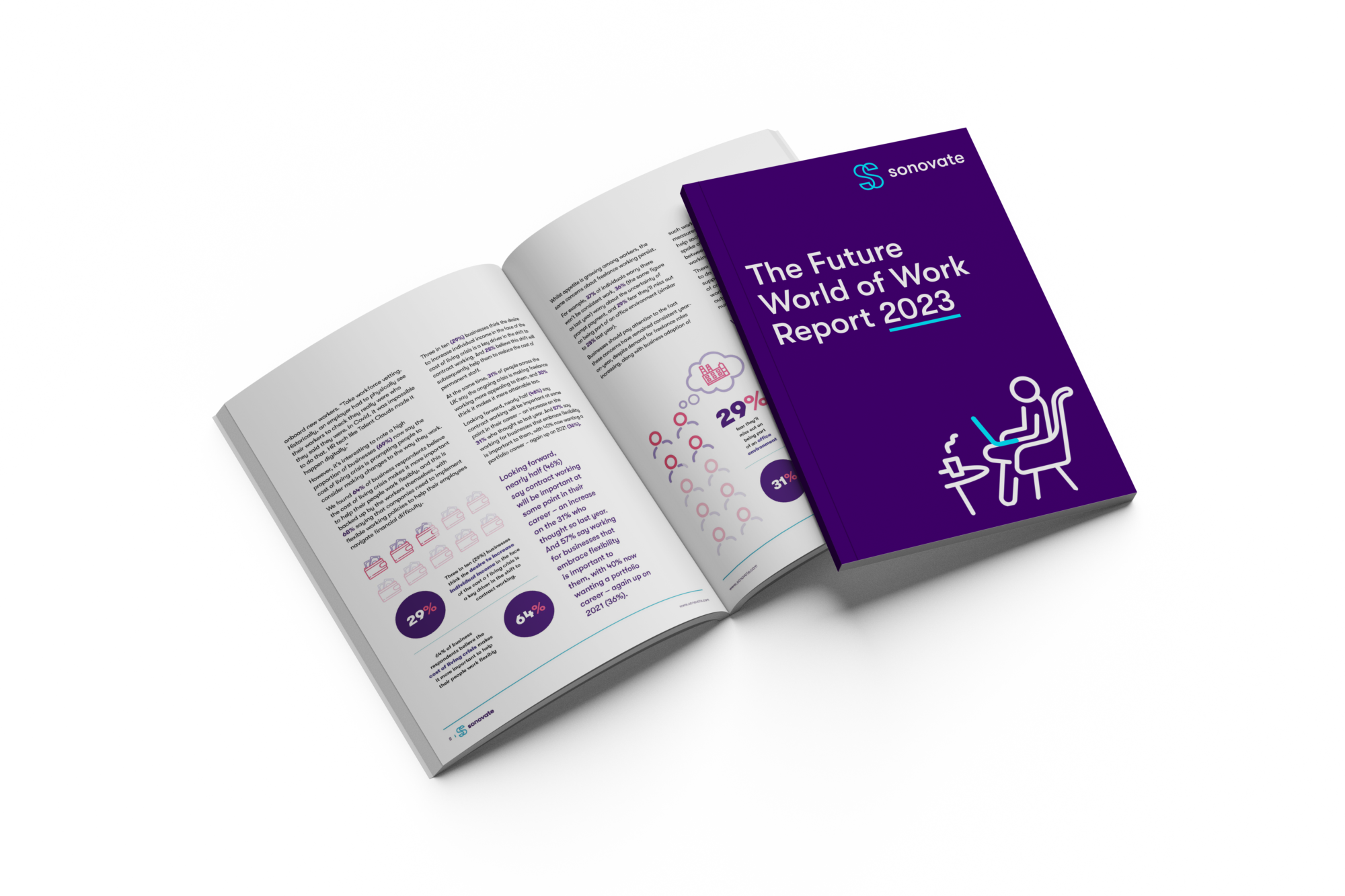Press Release: Millennial business leaders more likely to embrace flexible working than Baby Boomer counterparts
- New data reveals that three quarters (73%) of Millennial business leaders believe flexible working has been proven to work – considerably higher than their Baby Boomer counterparts (34%).
- Younger business leaders are also four times as likely than those aged over 55 to say they are open to hiring temporary workers.
- Research also suggests business leaders’ age and attitude to flexible working conditions may inform to what extent their employees are likely to demand them.
- Sonovate’s Future World of Work report found similar disparities between desire for flexibility among workers – with 18-34 year olds almost three times as likely to say portfolio careers are important to them, compared to workers aged 55 and over.
London – 29 March 2023 – A company’s approach to creating a flexible work culture can depend on the age of those running it, with younger business leaders more likely to receive flexible working requests, according to new data published by business finance lender Sonovate.
Three quarters (73%) of UK business leaders aged 34 and under say their companies have proven that flexible working works, in stark contrast with only two in five (41%) business leaders aged 55 or over. Likewise, younger business leaders are four times as likely to say they are more open to hiring temporary staff workers than they used to be (19% vs. 6% of over 55s), and while 78% of younger leaders say a greater proportion of their workforce is now made up of contract or freelance workers, only 35% of older leaders say the same.
Indeed only 7% of Baby Boomer leaders think companies should actively seek to accommodate more flexible working to support workers in the cost-of-living crisis – for example if someone needed to take on multiple jobs to increase their income – compared to three in ten (31%) leaders aged 34 or under.
This is despite the fact that 65% of all business leaders agree young people want to work more flexibly these days, and that younger and older business leaders alike (34% of 34 years and younger, and 37% of 55 years and older) recognise that the key driver to more contract and freelance working in recent years has been demand from workers to achieve working conditions that better suit their work/life balance priorities.
Baby Boomer leaders appear to be concerned about productivity of freelance or contract workers with only 41% saying a contingent workforce contributes to productivity, compared to 74% of Millennial leaders. And while 76% of young business leaders say the benefits of hiring contingent workers outweigh the investment to find them, this drops to 44% of over-55s.
The research found this could be having a knock-on impact on the likelihood employees will ask for flexibility in the way they work. Nearly six in ten (57%) younger business leaders say they are seeing more requests from their employees to work flexibly – while only one in ten (9%) older leaders say the same.
A reluctance to embrace flexible ways of working could well impact a business’ chance of recruiting or retaining talent, with Sonovate’s recent Future World of Work report finding nearly six in ten (57%) workers place importance on working for a business that embraces flexibility, while 67% say companies that offer flexible working are better places to work.
Richard Prime, CEO of Sonovate, comments: “There are so many ways for companies to embed flexible work cultures within their organisations; how flexibility works best in one company is always going to differ from how it succeeds in another. But one universal truth is that expectations of flexibility are fast becoming business norms and companies won’t prosper if they don’t acknowledge and accommodate these demands from workers. It’s intriguing to see that a company’s approach to flexibility may be dependent on its decision makers’ ages. Our younger generation of business leaders will surely force eventual change market-wide though as they will appeal more to more workers in a market where the skills gap is great and the competition for talent is tough.”
Sonovate’s Future World of Work report – which compiled evidence from 4,000 working adults as well as businesses – found it is particularly younger workers driving this shift in working patterns. Half (49%) of young workers (aged 18-34) say they don’t want to go back to how they worked before the pandemic, a sentiment shared by a quarter (24%) of over-55s, and 52% say talented young people won’t work for companies that don’t embrace flexibility.
Flexibility is key to younger workers’ long term career aspirations too. Being able to work on a part-time, contract or freelance basis at some point in their careers is important to 57% of 18-34 year olds, versus just 38% of over-55s. Specifically, having a portfolio career – where an individual maintains multiple jobs simultaneously rather than one role in a single organisation – is important to six in ten (59%) Gen-Z, compared to just one in five (22%) of Baby Boomers.
Dr Dale Whelehan, CEO 4 Day Week Global, comments: “Sonovate’s research supports the growing movement we are seeing towards employee-led interventions for the future of work. While flexibility remains a key component of enabling trust and building motivation amongst staff, we are still seeing huge disparities in company leadership on flexible working cultures. The emergence of Gen Z into the workforce has required re-imagination in to why, where, and how we work. Younger employees are demanding more of their employers to build high performance culture – and the trifecta of work arrangements which includes shorter working hours, hybrid working models and flexible models of working. Companies who design their ways of working in their organisations while being cognisant of these pillars of high performance will be leaders in the future of work.”
— Ends —
Notes to editors:
The second Future World of Work report by Sonovate can be downloaded here. The report includes surveys of 4,500 individuals including 500 UK small and medium sized business owners, as well as qualitative interviews with senior thought leaders from the future of work, employment and fintech sectors including 4 Day Week. Surveys were commissioned by Sonovate and conducted in November 2022 by Opinium, the independent market research consultancy.
Age splits:
18-24 – Gen Z
25-40 – Millennial
41-54 – Gen X
55+ – Baby Boomers
Media contacts
Sophia Houston, Kitty Guillaume, Karen Lester or Carmen Dixon, Seven Consultancy – sonovate@seven-consultancy.com
About Sonovate
Sonovate provides embedded finance and payment solutions for the contingent workforce, serving recruitment businesses, consultancies and labour marketplaces that engage contractors and freelancers across the world. Its global API-driven technology platform takes the hassle out of managing contract and freelance worker placement and pay. It enables companies to get back to growing their businesses, confident that funds are in place to help meet payment deadlines.
Since it began funding organisations in 2014, Sonovate has lent over £3 billion to more than 3,300 businesses in 40 countries to ensure over 30,000 people are paid in full and on time for the services they provide.




